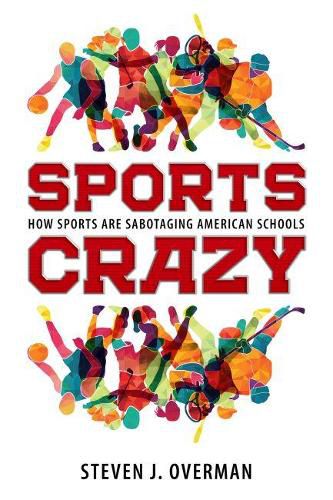Readings Newsletter
Become a Readings Member to make your shopping experience even easier.
Sign in or sign up for free!
You’re not far away from qualifying for FREE standard shipping within Australia
You’ve qualified for FREE standard shipping within Australia
The cart is loading…






This title is printed to order. This book may have been self-published. If so, we cannot guarantee the quality of the content. In the main most books will have gone through the editing process however some may not. We therefore suggest that you be aware of this before ordering this book. If in doubt check either the author or publisher’s details as we are unable to accept any returns unless they are faulty. Please contact us if you have any questions.
Sports Crazy: How Sports Are Sabotaging American Schools exposes the excesses of middle and high school sports and the detrimental effects our sports obsession has on American education. Institutions are increasingly emulating college and professional sports models and losing sight of a host of educational and health goals.
Steven J. Overman describes how this agenda is driven largely by partisan fans and parents of athletes who exert an inordinate influence on school priorities, and he explains how and why school administrators shockingly and consistently capitulate to these demands. The author underscores the incongruity of public schools involved in an entertainment business and the effects this diversion has on academic integrity, learning, life experience, and overall educational outcomes.
Overman examines out-of-control school sports within the context of a school’s educational mission and curriculum, with telling reference to impacts on physical education. He explores as well the outsized place of interscholastic sports beyond the classroom and scrutinizes the distorted relationship between intramural or recreational sports and elitist, varsity athletics. Overman’s chapter on tackle football explains many reasons why this sport should be eliminated from the school extracurriculum and replaced by flag or touch football.
Overman presents a brief history of interscholastic sports, and he compares and contrasts the American experience of school-sponsored sport to the European model of community-based clubs. Which approach better serves students? Overman recommends reforms in the context of a radical proposal to phase out interscholastic sports in favor of an intramural or club model. This approach would alleviate such problems as elitism and gender bias and reign in hypercompetitiveness while freeing schools to educate students rather than provide public entertainment.
$9.00 standard shipping within Australia
FREE standard shipping within Australia for orders over $100.00
Express & International shipping calculated at checkout
This title is printed to order. This book may have been self-published. If so, we cannot guarantee the quality of the content. In the main most books will have gone through the editing process however some may not. We therefore suggest that you be aware of this before ordering this book. If in doubt check either the author or publisher’s details as we are unable to accept any returns unless they are faulty. Please contact us if you have any questions.
Sports Crazy: How Sports Are Sabotaging American Schools exposes the excesses of middle and high school sports and the detrimental effects our sports obsession has on American education. Institutions are increasingly emulating college and professional sports models and losing sight of a host of educational and health goals.
Steven J. Overman describes how this agenda is driven largely by partisan fans and parents of athletes who exert an inordinate influence on school priorities, and he explains how and why school administrators shockingly and consistently capitulate to these demands. The author underscores the incongruity of public schools involved in an entertainment business and the effects this diversion has on academic integrity, learning, life experience, and overall educational outcomes.
Overman examines out-of-control school sports within the context of a school’s educational mission and curriculum, with telling reference to impacts on physical education. He explores as well the outsized place of interscholastic sports beyond the classroom and scrutinizes the distorted relationship between intramural or recreational sports and elitist, varsity athletics. Overman’s chapter on tackle football explains many reasons why this sport should be eliminated from the school extracurriculum and replaced by flag or touch football.
Overman presents a brief history of interscholastic sports, and he compares and contrasts the American experience of school-sponsored sport to the European model of community-based clubs. Which approach better serves students? Overman recommends reforms in the context of a radical proposal to phase out interscholastic sports in favor of an intramural or club model. This approach would alleviate such problems as elitism and gender bias and reign in hypercompetitiveness while freeing schools to educate students rather than provide public entertainment.